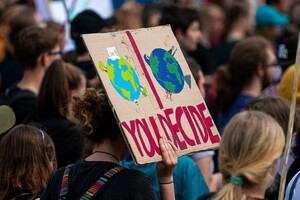Researchers urge to prepare for the worst scenario of global warming.

An international group of scientists published a report on climate change , in which she urged humanity to prepare for the worst-case scenario of global warming. What's more, there's a need to develop a plan for what will happen if — and when — our current way of life ends, Science Alert reports.
“Climate change has played a role in all mass extinctions. They led to the decline of empires and defined the course of history. Even the modern world seems to have adapted to a certain climatic niche,” said the lead author of the study, Luke Kemp from the University of Cambridge.
Also read: Finland has created a “sand battery” that will help fight climate change
p>
He also added that the likely damage will be caused not only by the increase in temperature, which leads to more frequent extreme weather events. This process also has side effects, such as financial crises, conflicts, disease outbreaks, which can hinder recovery from potential cataclysms such as nuclear war.
Scientists believe that the “old apocalyptic cavalry” – epidemics, waves and hunger – extreme weather must also be added.
Recent history has already shown humanity what pandemics, economic instability, global food shortages and their combination can be like. Although the consequences of these events are not very pleasant, the structure of civilization has remained intact.
But at some point, the structures that help us survive such storms can collapse.
Food shortages force people to come into contact with animal-borne disease reservoirs, resulting in successive pandemics. Famines accompany wars because they limit the distribution of food for years or even decades. Inflation ensues as the economy struggles to cope with the new rules of doing business in a hot, disaster-ravaged world.
“About 30 million people in the Sahara and the Gulf Coast live in conditions with an average annual temperature of 29 degrees Celsius. By 2070, these temperatures and the social and political consequences will directly affect two nuclear states and seven maximum security laboratories that house the most dangerous pathogens. There is a serious potential for catastrophic side effects,” said Li Xu, a social complexity researcher at Nanjing University.
The problem, the scientists say, is not that we can't imagine such an outcome. The problem is that competent risk management involves not only predicting possible scenarios, but also protecting against the consequences that may arise from them.
In an optimistic scenario, we could correct the situation and postpone such events a little. This requires a combination of behavior change, policy action and innovation. It may even help stop temperature increases from plateauing without leading to a new possibility of disaster every six months.
If things continue as they are now, which the Intergovernmental Panel on Climate Change (IPCC) is virtually certain to do, between Between 2030 and 2052, the temperature on the planet will rise by 1.5 degrees Celsius compared to the pre-industrial level.
There is also a one-in-five chance that at a carbon dioxide concentration of about 560 parts per million (ppm), the atmospheric temperature will be several degrees warmer. As of May this year, the indicators reached 420 parts per million.
The IPCC report, published this year, shows that the governments of the world are not paying enough attention to this issue.
Related video
We remind you , data from the European Copernicus satellite system showed that the last seven years were the hottest on record. Last year, 2021, became the fifth in the list of the hottest years, in some regions temperature records were registered.
See the special topic: Abnormal temperatures critically accelerated the melting of Greenland's glaciers The island lost six billion tons of water every day for a week. The heat will only intensify in the next 40 years – WMO Temperatures are rising to abnormal levels more and more often due to climate change. A “sand battery” was created in Finland that will help fight climate change According to the developers, the battery should solve the main problem of green energy. Antarctic's only endemic insect may disappear due to climate change Winters are getting warmer, making it harder for insects to survive. Global warming could help open an Arctic sea route not controlled by Russia The Northern Sea Route is currently one of the few ways to sail across the Arctic.




